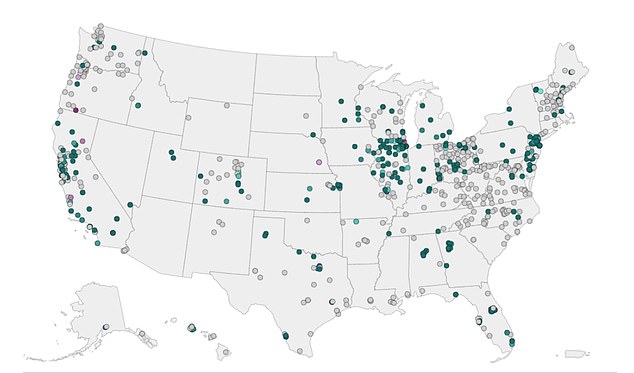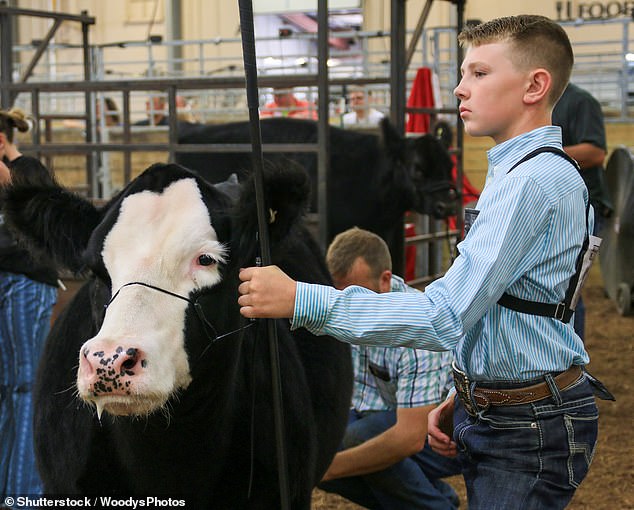Americans venturing out to state fairs next month should be on high alert for bird flu, health experts warn.
Popular petting zoos and popular milking demonstrations pose a high risk of transmission of a virus that is becoming more risky for humans.
Fourteen Americans have been infected with the H5N1 strain this year and the White House is funding efforts to test human vaccines against bird flu in case transmission becomes more widespread.
All of this year’s cases involved contact with dairy cows or poultry, both staples at state and county fairs.
State and county fairs will adjust their livestock screening measures next month to mitigate the risk of bird flu. Many are requiring farmers to provide proof that their cows have tested negative for the virus.

This interactive map shows current site-level data on influenza A virus in wastewater. Avian influenza is a strain of influenza A virus.
Fair organizers across the country have taken precautionary measures to keep attendees safe, primarily by limiting people’s access to the cows. To do so, they will keep people away from lactating cows and prevent spectators from milking them.
Visitors will notice some big changes this summer.
Minnesota, for example, will not include cows and calves in its Miracle of Birth exhibit at the state fair.
And cows exhibited at Missouri fairs will be required to have proof of a negative flu test.
Hundreds of state and county fairs will be held across the country over the next few months, with thousands of Americans petting goats, touring barns, milking cows and watching animals give birth.
Dr Andrew Bowman, a veterinary professor at Ohio State University, said: ‘What we do at fairs violates every biosecurity principle we preach, we do it on public display and we charge the public.
‘While fairs are very useful for agricultural education, they create situations where multiple species from different farms are gathered in one location.’
The CDC has confirmed 14 cases of bird flu in farmers who work with poultry and dairy cattle since 2022, with Colorado now reporting nine cases.
The public health agency has launched an online monitoring dashboard based on surveillance of wastewater samples.
The dashboard is based on wastewater samples that tested positive for influenza A viruses, such as the H5N1 strain that infects cattle on U.S. dairy farms. The data is presented in map form and compares positive tests to those from the same period last year to look for spikes.
The University of Minnesota Extension, a public health education service, last week published a guide to cow fairs.
It is recommended that lactating cattle not attend fairs until the end of 2024, as raw milk contains high concentrations of the avian influenza virus.
And fans of Minnesota’s Miracle of Birth Center, where visitors can watch cows and other animals give birth, will be cow-free this year.
The fair will continue to feature mother cow and calf pairs, but the mother cows will not be lactating and the calves will be weaned.
An increasing number of state and county fairs also have veterinarians on staff to verify that cows entering the fairgrounds have tested negative for the flu.
Wisconsin Veterinary Superintendent Dr. Tia Kastenson said, “They’ll collect the paperwork, make sure all the lactating cows have their (test) dates up to date and then monitor them when those cows come out of the trailer.
“If there’s anything questionable, they’ll be removed (the cows) before they enter the barn.”
Farmers bringing lactating dairy cows to the Missouri State Fair next month will be required to test the animals’ milk for the H5N1 virus no later than a week before their arrival. Those who arrive at the fair with dairy cows that have not been tested will be turned away.
The fair organisers have also decided to close the area where spectators can milk the cows themselves.
Missouri State Veterinarian Dr. Steve Strubberg said, “Once (bird flu) is in a cow, it spreads to herd mates through the milking process.
‘For that reason, the State Fair Commission will not allow regular exhibitors to use the milking parlor as if they were using the same equipment, from cow to cow and from herd to herd.’
The risk of contracting bird flu for the average non-farmer is low thanks to the power of pasteurization, which kills bacteria and viruses in milk before it reaches stores.
According to the USDA, “At this stage, there are no concerns about the safety of the commercial milk supply or whether this situation poses a risk to consumer health.”
The CDC on Tuesday announced a $10 million grant to help curb the spread of bird flu among farmworkers, including millions allocated to vaccinate them against a variety of flu strains, including avian flu.
CDC Director Nirav Shah said: “Preventing seasonal flu in these workers, many of whom are also exposed to avian flu, can reduce the risks of new flu strains emerging.”


